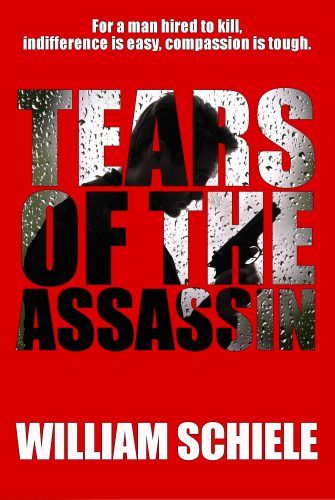William Schiele packs a hefty amount of action and intrigue into Tears of the Assassin, his debut novel published by Inkshares last week. In Assassin, David Diegert, a half-Ojibwa half-white American, is passed from gauntlet to gauntlet, his situation growing worse and worse, until he’s forced to take work as a contract killer on the Dark Web. Abused by his father, brother, and high school classmates, Diegert decides to join the military, hoping that he cam earn college tuition through his service. He’s put into service with an unofficial group funneling heroin into the US from Afghanistan, and when he loses his temper at his superior officer, he’s dishonorably discharged and told to keep quiet about his actions in the military.
He ends up bouncing at a bar stateside, where he gets caught up in Russian mafia intrigue, which ultimately forces his hand, turning him into a killer. Out of options, this is when he decides to go all in on being a killer-for-hire on the Dark Web.
Which gets him deeper into trouble, working for a shadowy illuminati-esque organization working on the final stages of its plan to dismantle the US in order to own the world’s last valuable currency, a bitcoin-esque affair.
If my summary makes Tears of the Assassin seem like a book that does a good deal of meandering, that’s because it is. As I read, checking the percentage of the book I’d completed, I found myself wondering when the other shoe would drop. The action was great, the writing compelling, and the characters interesting, but I felt like the book was missing a sort of cohesion, a central arc toward which Diegert would be thrust. It may be the fact that he’s such a capable and active protagonist that draws attention to his seemingly aimless wandering, but the fact remains that he feels like an arrow loosed for firing’s sake; lacking a target, but attractive in flight.
There are appealing twists and turns in Tears of the Assassin, made especially effective by the manner in which hints are dropped just prior to the reveal, making the reader feel clever for being one step ahead of Diegert. All in all, it’s a thrilling read—punctuated by intense moments of violence and thrilling chase scenes and the like.
But let’s talk for a moment about the title and its connection to one of the themes of the novel. Tears of the Assassin specifically refers to the fact that Diegert is an efficient machine when he’s in “kill mode,” but collapses under the weight of his actions when he’s with women—often those he’s shared a moment of intimacy with. Diegert is our Killer with a Conscience™️, the ruthless man who weeps on the shoulder of the closest available woman at his own ruthlessness. It leads to somewhat problematic characterizations of gender roles in the novel, but this was intentional. When he’s confronted by the reality of his limited, somewhat clichéd view of the world, Diegert doesn’t quite know how to respond. It ends up shining a light on his own twisted view of things, and though he never seems to resolve that particular thread, it’s an important question that is asked well.
Problematic characterizations notwithstanding (whether they were intentional or otherwise), Tears of the Assassin is a good read. It’s dynamic, action-packed (if a smidgen directionless at times), and just plain fun.
Bonus points to Mr. Schiele for an ending that didn’t redeem Diegert at all, but followed exactly the kind of failures and challenges that plagued Diegert throughout his story. The ending really tied the book with a neat, dark bow.
Tears of the Assassin is available on Amazon and directly from Inkshares.



3 Responses
who has the trademark to “Killer With A Conscious”?
Hi there! Nobody owns the trademark to Killer with a Conscience. I used the mark to imply that the Killer with a Conscience is a character archetype that has a certain appeal.
Sweet! Great review, I’ll have to check Tears of the Assassin out!